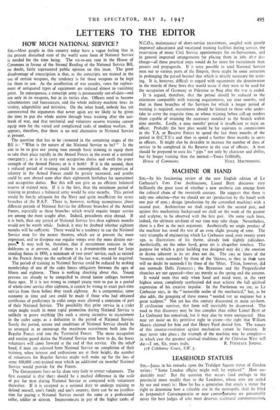MACHINE OR HAND
Sta,—In his fascinating review of the new English edition of Le Corbusier's Vers Une Architecture, Lionel Brett discusses very brilliantly the great issue of whether a new aesthetic can emerge from the cultural chaos of the twentieth century. He suggests that there is only one solution—that we should see art (production by the hand) with one pair of eyes ; design (production by the controlled machine) with a second pair. Architecture we shall regard with the second pair, and against this mechanistic background we shall set the work of the painter and sculptor, to be observed with the first pair. On some such lines, indeed, the ultimate art-form of our time may take shape. Nevertheless, there is a flaw in the neat argument. Aesthetically no single product of the machine has stood the test of an even slight passing of time. The very triumphs of engineering which Le Corbusier used, over twenty years ago, as illustrations of his theme, already look slightly ridiculous. Aesthetically, on the other hand, great art is altogether timeless. The purpose for which a great building was designed may die ; the emotion or drama inherent in its art does not die. The cars or liners of the 'twenties were outmoded by those of the 'thirties, as they in their turn will no doubt be outmoded by those of the 'fifties. Titian, however, did not outmode Della Francesca ; the Byzantine and the Perpendicular churches are not opposed—they arc merely as the spring and the autumn.
It would seem that only when hand and mind were, in the very highest sense, completely synthesised did man achieve the full spiritual expression of his creative impulse. In the Parthenon we are, as Le Corbusier says, in the " inexorable realm of the mechanical," but, as he also adds, the grouping of these stones "needed not an engineer but a great sculptor." Not yet has this century discovered its main art-form. If civilisation survives, that form will inevitably be discovered. The road to that discovery may be less complex than either Lionel Brett or Le Corbusier has conceived, but it may also be more unexpected. Man may yet insist on his primitive right to create—the right that William Morris claimed for him and that Henry Ford denied him. The nature of this counter-revolution against mechanism cannot be foreseen. It may never take place ; the triumph of the machine may be complete— in which case the greatest spiritual traditions of the Christian West will


































 Previous page
Previous page